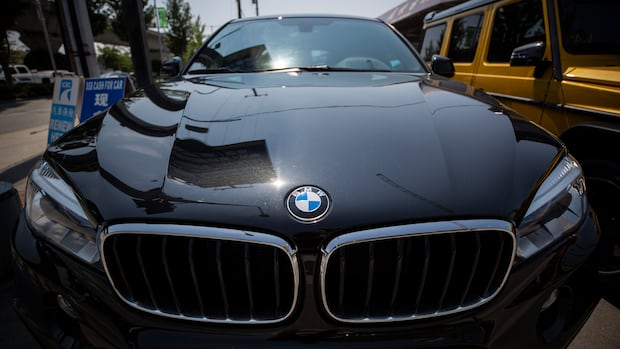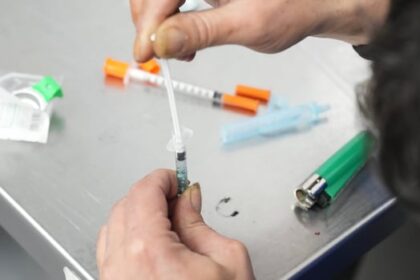More than six years after a provincial report into money laundering warned about the rise of a so-called “grey market” exporting Canadian luxury cars to China — many of the insurance agents who processed paperwork enabling the shadowy deals are facing sanctions. The Insurance Council of B.C. — which regulates agents and brokerages — has issued fines and suspended licences in recent months of more than a dozen agents who helped exporters sidestep rules designed to prevent them from sending new vehicles out of Canada.According to a series of disciplinary orders, the agents facilitated the purchase of one-year insurance policies on hundreds of Mercedes, BMWs and other luxury vehicles — knowing they were destined to be cancelled within days as the cars were shipped off to China.In the process, documents suggest the insurance agents exposed a major flaw in ICBC’s payment scheme — pocketing half a million dollars worth of commissions on cancelled policies the insurer didn’t get back until the widespread wrongdoing was investigated.In some cases, the agents even acted as so-called “straw buyers” themselves — purchasing high-end vehicles with money given to them to act as fronts for exporters.Confidential adviceThe penalties appear to be the final word on a practice which made headlines in 2019 when it was identified by former RCMP deputy commissioner Peter German, sparking investigations by both ICBC and the Insurance Council of B.C.Because the two organizations share the same acronym — a point of occasional confusion in the industry — the council will be referred to as “the regulator” for the rest of this story.Peter German, front left, former deputy commissioner of the RCMP, warned about a ‘grey market’ for luxury vehicles in 2019 as then-Attorney General David Eby stood behind him. (Darryl Dyck/Canadian Press)CBC obtained internal documents through freedom of information requests from both ICBC and the regulator detailing purchases of tens of millions of dollars worth of vehicles by exporters looking to profit from the huge discrepancy in luxury car prices between Canada and China.A 2020 report by accounting firm MNP described straw buyers as “individuals who represent themselves as the purchaser of the vehicle for their own use when in fact they are deployed by the person or company who is the conduit for exporting the vehicle to the foreign market.””The scheme typically involves an order for a specific vehicle from a buyer in a foreign market. The order is received by a contact or exporter which may or may not be affiliated with organized crime,” says the confidential report, which was written for the regulator.”The straw buyer is paid a commission which can range between three per cent and five per cent.”WATCH | CBC’s Jason Proctor reports on luxury car ‘grey market’:Insurance agents penalized for role in luxury car ‘grey market’Documents obtained by CBC News are shedding new light on the so-called grey market for luxury cars, in which millions of dollars worth of vehicles were shipped from B.C. to China while insurance agents pocketed thousands in commission. As Jason Proctor reports, the scheme continued long after concerns were first raised.It’s not illegal to export a new vehicle, but companies like BMW and Mercedes have their own dealerships in China, so they began placing conditions on sales and leases forbidding the resale of vehicles for export from Canada. They also installed tracking software to ensure cars remain in North America.New car dealers also forced purchasers to get a full year’s insurance rather than the temporary operating permit that ICBC normally mandates for cars destined for export.CBC drew up this chart depicting grey market luxury vehicle transactions based on a similar chart prepared by MNP accounting for the Insurance Council of B.C. (MNP/CBC)The documents obtained by CBC include a “confidential” memo written in 2021 to Premier David Eby — who was attorney general and minister responsible for ICBC at the time — about the first two insurance agents suspended in connection with an export scheme.Both of them are licensed insurance agents now — even as others are finally facing penalties for behaviour that occurred years ago.And although names have been redacted in the documents released to CBC — the case details they contain match those in the publicly available versions of events described in the regulator’s decisions.’Faked’ T4s, credit card records, ferry receipts: reportIn the most recent decision, insurance agent Wanan (Page) Li’s licence was cancelled this July after she was caught acting as straw buyer for an exporter who funded her purchase of a $116,000 Mercedes in 2023.According to an ICBC investigation report, Li responded to an ad “seeking a buyer for an exported vehicle.”An insurance agent who was sanctioned for acting as a ‘straw buyer’ for a car exporter allegedly faked documentation including a T4 and credit car records. (Primestock Photography)”She provided the vehicle to a male who paid her $30,000 in cash and a promise for the balance owing to be delivered at a later date,” the report says.”He never delivered the initial funds and allegedly advised her to make a stolen vehicle claim for the vehicle.”In February 2024, Li allegedly claimed the vehicle was stolen on Vancouver Island, “and faked documentation including a T4, credit card records, ferry receipts, Uber receipts and phone records,” the ICBC report says.Li was ordered to take ethics courses and banned from the profession for three years. She told the regulator she will also have to pay $1,665 a month for the next six years to cover off the money still owed for the car loan.A stack of licence platesBy contrast, Ting En (Brian) Lin and Anthony Bryan Chua Cua — the two agents whose wrongdoing sparked ICBC’s investigation — each received a one year suspension and fines of $5,000 and $7,000 respectively when they were sanctioned in February 2021.The orders against them are cited as precedent for the recent penalties and are written in a type of anonoymized legalese that makes their actions difficult to understand. Two insurance agents were sanctioned in 2019 for helping a used car dealer circumvent an agreement between Mercedes Canada and Mercedes dealerships that barred the sale of luxury vehicles to export companies. (Maxim Shemetov/Reuters)But details from ICBC’s internal documents provide a clear view of what happened.The scheme was discovered in December 2017 when a manager at the East Vancouver brokerage where Lin and Cua worked discovered a stack of licence plates stored under one of their desks.A preliminary investigation revealed “a pattern of issued policies that were subsequently cancelled within a few days.”The confidential memo says Lin and Cua worked with a Burnaby used car dealership that “circumvented an agreement between Mercedes Canada and Mercedes dealerships that barred the sale of luxury vehicles directly to export companies, using a third party.””The agent told ICBC’s (special investigations unit) that Mercedes required one-year insurance policies to be taken out as a condition of purchasing its vehicles,” the minister was told.”The agent issued one-year policies knowing that the vehicles would soon be sold to (the used car dealer); he was also aware that the policies would soon be cancelled, and that he would collect commission on the transactions.”The government memo says Cua — who performed about 300 transactions — believed “neither the transactions nor the resulting commissions were illegal or unethical … he said the resulting commission was an issue with ICBC’s commission structure.”Lin performed between 30 and 40 transactions. The confidential memo says he “considered the policy commission acceptable from a legal and ethical perspective, though he acknowledged that ICBC would not support the practice.”Both men also purchased vehicles on behalf of trading companies. Lin said he bought several vehicles on behalf of a numbered company.”The agent drove these vehicles to a pre-designated parking lot, and the numbered company provided him with a bank draft to pay for them; he also purchased an insurance policy which he subsequently cancelled,” the report to the minister says.”While there are no rules preventing these types of transactions, they are believed to conflict with the spirit of the Motor Dealers Act.”The regulator’s decision says both Cua and Lin were “apologetic” and expressed regret for their conduct. Lin claimed there was a lack of clear guidelines governing the transactions, which he later came to understand were “exploitative of ICBC.”Agents keep the commissionMany of the insurance agents sanctioned this year also seemed surprised ICBC did not initially claw back commissions on policies cancelled within hours or days.According to the regulator’s ruling against him, Derek William Fung, an agent whose one-year suspension ends next February, “stated that he found it ‘weird’ that ICBC didn’t have a clawback commission provision in place, so he believed it was acceptable.”Many of the cases involve insurance agents who helped customers get one year policies that were cancelled within hours or days. The agents were able to keep the commissions, money the insurer later clawed back. (David Horemans/CBC)Fung processed 55 short-term transactions involving new or newer luxury vehicles.”It wasn’t my intention to defraud ICBC, [I] thought it was just allowed to do it. If I knew it was going to get me in trouble or it was not allowed, I wouldn’t have done it,” he told the regulator”Any money I made, it wasn’t worth it. Insurance was supposed to be my career and I wouldn’t jeopardize it for this. I regret it happened.”In another of the regulator’s decisions, Dawei (David) Diao was suspended for 18 months — beginning in March 2025 — after he admitted using editing software to alter vehicle registration documents.He also processed 137 short term policies, many of them paid for with the same credit card.”The Licensee explained that he did not realize that what he was doing was illegal and stated that because ICBC was such a large corporation, he did not feel that conducting the transactions in this way was a ‘big deal,'” the ruling against Diao reads.”The Licensee further explained that when cancelling the policies, the premiums were usually refunded by cheque because the individuals wanted to collect points on their credit cards.”Independently of the regulator, ICBC has permanently prohibited Diao from conducting Autoplan business; the prohibition is eligible for review after Dec. 23, 2025.In a statement to CBC News, ICBC said the corporation has “levied and recovered approximately $574,000 in returned commissions and sanctions as a result of investigations into instances of brokers receiving unearned commissions.””We’ve also barred brokerage owners and their licensees from accessing ICBC systems and from conducting any business on behalf of ICBC,” the statement said.”We continue to monitor broker activity and we’re also reviewing our processes to determine if there are other ways to help mitigate inappropriate broker activity related to commissions.”Ministry of Finance respondsGerman’s money-laundering report claimed that organized crime figures were “unhindered in their ability to launder the proceeds of crime through high-end, luxury vehicle purchases within Greater Vancouver.”He said vehicle dealers had accepted large sums of cash from “suspicious individuals” to pay for the cars, and that there was no way to determine the source of wealth for the straw buyers or the exporters paying them.Premier David Eby was attorney general and minister responsible for ICBC at the time Peter German’s report on money laundering was released. The insurer gave him a confidential memo detailing allegations against two insurance agents accused of assisting car exporters. (Ben Nelms/CBC)”Provincial employees identified numerous red flags of money laundering; including 4,108 unique straw buyers, with 48 making in excess of 11 transactions, one making in excess of 25 purchases, and 1,000 apparently linked to one exporter,” German’s report said.German noted that the province also paid out millions in provincial sales tax rebates issued to straw buyers and exporters who had the gall to apply for PST refunds on their pricey purchases.By contrast, the MNP report said further information was needed about the source of the funds used to buy the vehicles to make a determination as to whether money laundering was involved.In a statement, a Ministry of Finance spokesperson said the province received a total of 16,550 refund applications related to motor vehicle exports between 2016 and 2021 — the year B.C. acted to end PST refunds on grey market vehicle transactions.The ministry also noted that a provincial commission on money laundering that followed German’s report suggested further data was needed on the involvement of money laundering in grey market exports.”The extent to which proceeds of crime are actually being laundered through vehicle export versus the use of legitimate funds is unclear,” a ministry spokesperson said.”Engaging in grey market exports with the use of legitimate funds is lucrative because of the international price difference that can support profits for resale to buyers in other jurisdictions that exceed the purchase price paid in Canada.”Just this April, FINTRAC also brought in new regulations requiring car dealerships to report suspicious transactions and watch for red flags around the purchase or leasing of passenger vehicles valued at more than $100,000.Lawsuit alleges ‘knowing participation’ In an interview, Insurance Council of B.C. director of professional conduct Marko Goluza said the regulator initiated its own investigation into short-term cancellations after complaints against Lin and Cua — which explains the six-year lag between German’s report and recent sanctions.The regulator has issued 17 decisions against agencies and individuals totalling 20 years in suspensions or prohibitions, five licence downgrades and $90,000 in fines. Goluza said the longest suspension was for 10 years.Beyond decisions sanctioning insurance agents, B.C.’s courts have also seen a raft of lawsuits filed by car companies against alleged ‘straw buyers.’ (Peter Scobie/CBC)”We do look at precedent. We look at the reach and the mandate of the professional regulator and that is how we sanction,” he said. “So if somebody loses their ability to work in an industry for a year, that’s a very significant deterrent for a professional.”Goluza said the regulator also has the ability to refer files to other bodies — like the Canada Revenue Agency or the RCMP — where wrongdoing occurs.Beyond the regulator’s decisions, B.C.’s courts have also seen a raft of lawsuits filed by car companies against alleged straw buyers.The bulk of the cases reviewed by CBC News have resulted in default judgments in favour of the companies, but the cars at the centre of the litigation have usually been moved to China by the time the court rules.In a lawsuit filed by Mercedes this summer, a Burnaby car salesman is accused of acting as a straw buyer for an exporter who shipped a 2020 Mercedes to China, in violation of the sales agreement.”The defendants conspired with one another to obtain the vehicle from the plaintiff through fraudulent means and export the vehicle to China for profit,” the notice of claim says.In what appears to be a legal first, an amended claim filed in September cites German’s report as grounds for punitive damages against the alleged straw buyer and the exporter.”The defendants’ active and knowing participation in the grey market export of luxury vehicles is conduct that merits an award of punitive damages in order to punish (them) and deter others from engaging in similar acts for profit.”Both the buyer and the exporter have denied the allegations.
Fast cars and easy money: Insurance agents penalized for role in luxury car ‘grey market’











